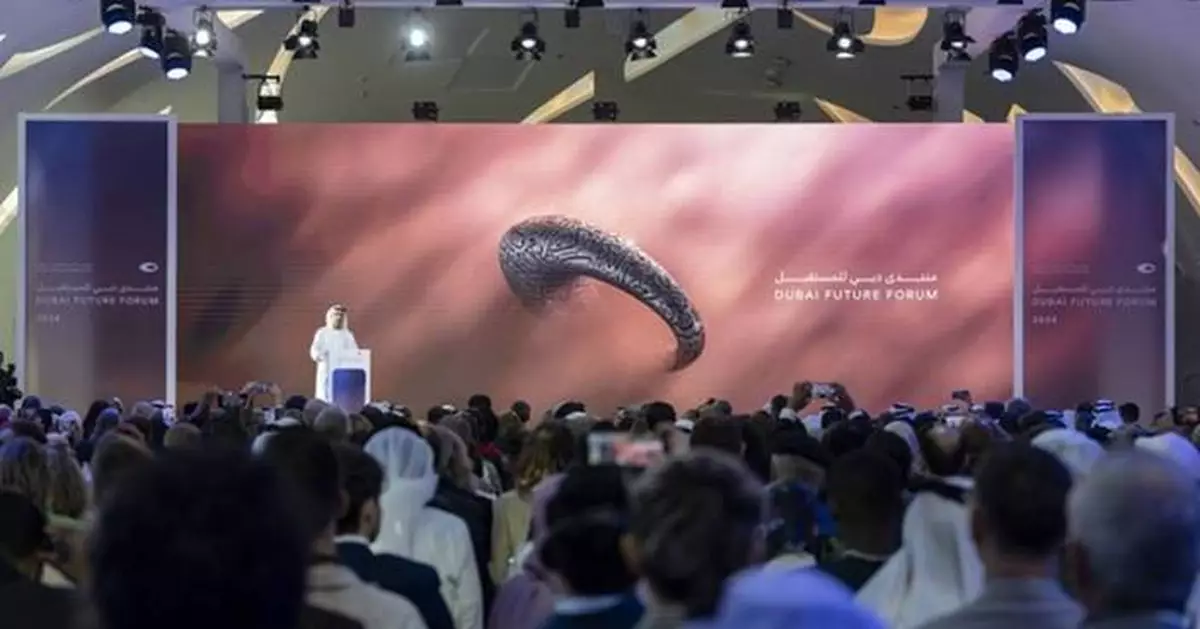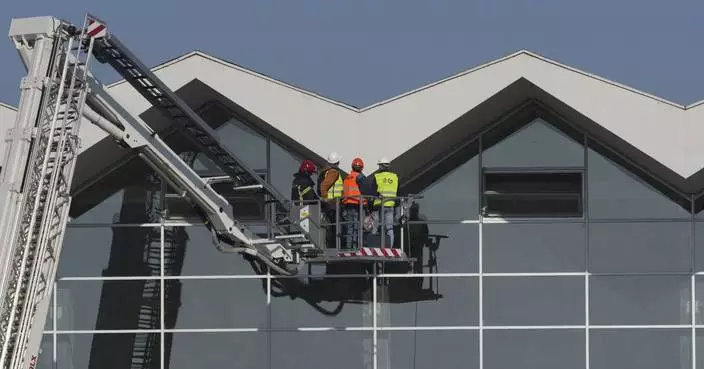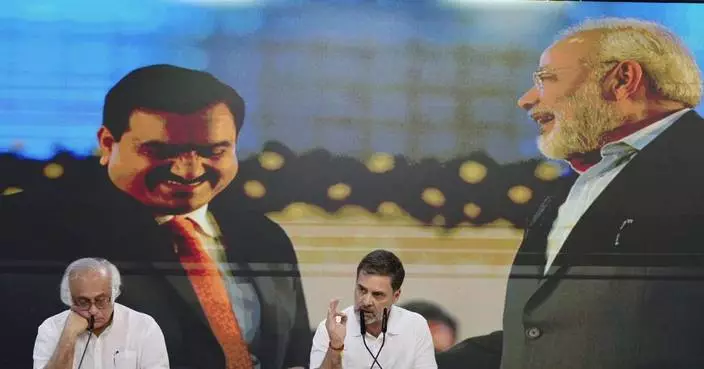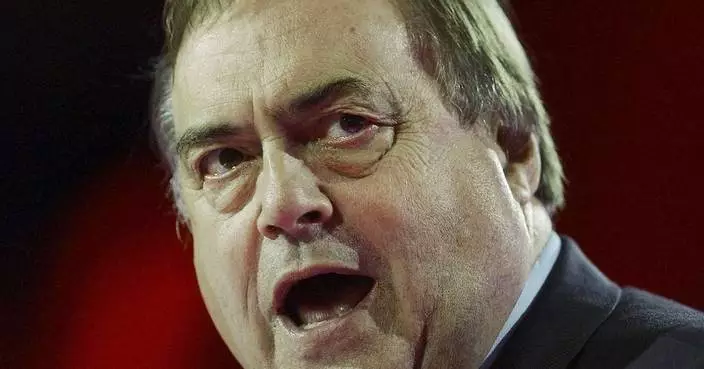DUBAI, United Arab Emirates--(BUSINESS WIRE)--Nov 21, 2024--
Imagine your boss is a robot or your mind is connected to a computer chip. What does this mean for the future of humanity? Scientists from over 100 countries met this week at the Dubai Future Forum, the world’s largest gathering of futurists, to discuss the challenges ahead in a world where technological innovation and artificial intelligence are shaping the future.
This press release features multimedia. View the full release here: https://www.businesswire.com/news/home/20241121108203/en/
Will humanity settle on the Moon? Will children be taught from home? Experts at the Forum predict revolutionary changes ahead that will transform the way people live, companies are managed and the universe is explored.
New framework for innovation
Innovation requires an adaptive framework, such as regulatory labs and sandbox systems, to foster technological progress while ensuring safety. “These systems and initiatives bring policymakers, entrepreneurs, and stakeholders together to collaborate and refine solutions,” explained Khalfan Belhoul, the CEO of Dubai Future Foundation, stressing the importance of fostering ecosystems that accelerate innovation while maintaining safety and scalability.
The technology supercycle will reshape the world, change corporate roles
The current era is defined by a 'technology supercycle,' driven by three transformative technologies: artificial intelligence (AI), biotechnology, and advanced sensors. Over the next five years, these technologies are expected to profoundly reshape sectors and societies worldwide. For the first time in history, a Fortune 500 company might even be led by AI.
“We’ve already seen the emergence of AI in executive roles,” Khalfan says. “Evolution will force us to rethink what it means to lead. So, next year, you might see a leader that is AI-driven, not a humanoid.”
The convergence of AI and biotechnology is set to revolutionize medicine and enhance mobility. This integration will drive breakthroughs in therapeutics, materials science, and climate solutions. Healthcare will become increasingly personalized, with the potential to create digital twins of individual bodies, enabling treatments precisely tailored to specific conditions. Health protection will also become more effective as advancements in epigenetics allow for the regulation of gene activity without altering DNA. Lastly, brain-wave-controlled software and hardware could empower individuals to achieve greater independence and mobility, transforming lives in unprecedented ways.
Large Action Models (LAMs) will transform workflows
According to Amy Webb, CEO of the Future Today Institute and a friend of the Forum, society will move from Large Language Models (LLMs) to Large Action Models (LAMs), which will predict human actions, enabling smarter decision-making and personalized workflows. For example, LAMs could assist in strategic decisions or simulate personalized health scenarios. This evolution will expand AI's use across industries such as manufacturing, healthcare, and urban planning.
Turning to nature for energy security: doubling solar and new energy sources
With COP 29 convening this week, the question of finding solutions to the energy crisis and combating climate change is also centre stage in the debate at the third edition of Dubai Future Forum. Experts predicted a doubling of global solar energy capacity from 220 gigawatts in 2024 to 450 gigawatts in 2025 – more than the total installed power capacity of Germany and Spain combined. The Forum also showcased novel energy alternatives, such as a prototype for soil-powered renewable energy for IoT sensors by Terracel from Stanford University.
Investment in nature-based solutions will help reduce climate-related losses
According to Laila Abdullatif, Director General of Emirates Nature-WWF, damages in frontline communities could reach USD 800 billion by 2030. Natural defenses such as coral reefs and mangrove forests act as critical flood barriers and have the potential to prevent further damage from the climate change aftermath.
About the Dubai Future Forum
Dubai Future Forum 2024 is the world’s largest gathering of futurists, experts, and organisations specialised in future design. Organized by the Dubai Future Foundation at the Museum of the Future, the forum brought together more than 150 global speakers and 2,500 experts, alongside representatives from 100 international organisations.
For more information on the Dubai Future Forum, please visit: dubaifuture.ae/dubai-future-forum-2024
Media Kit
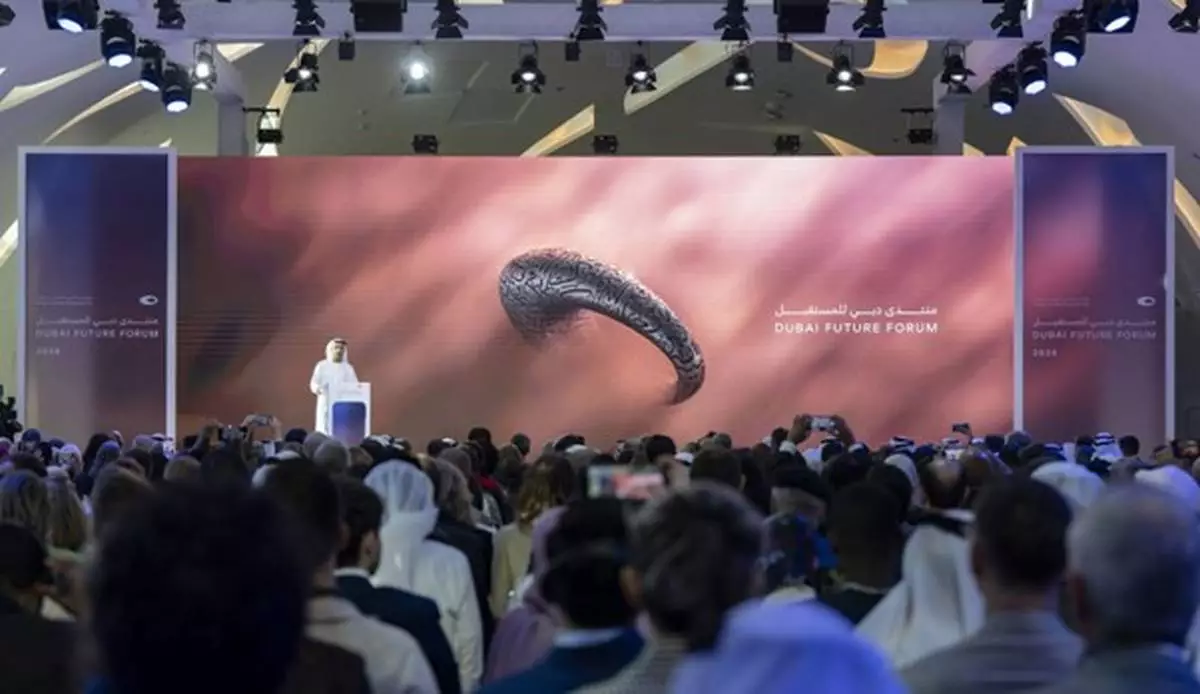

Dubai Future Forum 2024 (Photo: Business Wire)
BAKU, Azerbaijan (AP) — Countries of the world took turns rejecting a new but vague draft text released early Thursday which attempts to form the spine of any deal reached at United Nations climate talks on money for developing countries to transition to clean energy and adapt to climate change.
The draft left out a crucial sticking point: how much wealthy nations will pay poor countries. A key option for the lowest amount donors are willing to pay was just a placeholder “X.” Part of that is because rich nations have yet to make an offer in negotiations.
So the host Azerbaijan presidency with its dawn-released package of proposals did manage to unite a fractured world on climate change, but it was only in their unease and outright distaste for the plan. Negotiators at the talks — known as COP29 — in Baku, are trying to close the gap between the $1.3 trillion the developing world says is needed in climate finance and the few hundred billion that negotiators say richer nations have been prepared to give.
Introducing the plan, lead negotiator Yalchin Rafiyev emphasized how balanced the plan was, but all sides kept saying it was anything but balanced and pointed time was running out.
“We would like to correct the balance. It is completely tilted,” Pakistan delegate Romina Khurshid Alam said.
Developing nations blasted both rich nations and the presidency with Honduras delegate Malcolm Bryan complaining that the plan was a "completely unbalanced text that doesn’t bring us any closer to a landing .... It is high time for developed countries put their numbers on the table.’’
The EU's climate envoy Wopke Hoekstra called the draft “imbalanced, unworkable, and not acceptable.”
In a statement, the COP29 Presidency stressed that the drafts “are not final.”
“The COP29 Presidency’s door is always open, and we welcome any bridging proposals that the parties wish to present,” the Presidency said in a statement. It added that possible numbers for a finance goal will be released in the next iteration of the draft.
COP29 President Mukhtar Babayev convened the Qurultay — a traditional Azerbaijani meeting — where negotiators spoke to hear all sides and hammer out a compromise. He said that “after hearing all views, we will outline a way forward regarding future iterations.”
Independent experts say that at least $1 trillion is needed in finance to help transition away from planet-warming fossil fuels and toward clean energy like solar and wind, better adapt to the effects of climate change and pay for losses and damages caused by extreme weather.
Colombia's environment minister Susana Mohamed said without a figured offered by developed nations, “we are negotiating on nothing.” Other nations gave the Mohamed a round of applause as her statement concluded.
Esa Ainuu, from the small Pacific island of Niue also blasted the lack of a number in the draft deal.
“For us in the Pacific, this is critical for us,” Ainuu said. “We can’t escape to the desert. We can’t escape somewhere else. This is reality for us. If finance is not bringing any positive, (then) why’re we coming to COP?”
She added: “I don’t even know if we’re going to be here for a COP 30 or COP 31. Something needs to happen.”
Mohamed Adow, director of the think tank Power Shift Africa, also expressed disappointment at the lack of a figure. “We need a cheque but all we have right now is a blank piece of paper,” he said.
Iskander Erzini Vernoit, director of Moroccan climate think-tank Imal Initiative for Climate and Development, said he was “at a loss for words at how disappointed we are at this stage to have come this far without serious numbers on the table and serious engagement from the developed countries.”
There are three big parts of the issue where negotiators need to find agreement: How big the numbers are, how much is grants or loans, and who contributes.
Official observers of the talks from the International Institute of Sustainable Development who are allowed to sit in on the closed meetings reported that negotiators have now agreed on not expanding the list of countries that will contribute to global climate funds — at least at these talks. Linda Kalcher, of the think tank Strategic Partnerships, said on the question of grants or loans, the draft text suggests “the need for grants and better access to finance.”
Other areas that are being negotiated include commitments to slash planet-warming fossil fuels and how to adapt to climate change. But they’ve also seen little movement.
European nations and the U.S. criticized the package of proposals for not being strong enough in reiterating last year’s call for a transition away from fossil fuels.
“The current text offers no progress” on efforts to cut the world’s emissions of heat-trapping gases, said Germany delegation chief Jennifer Morgan. “This cannot and must not be our response to the suffering of millions of people around the world. We must do better.”
Eamon Ryan, Ireland’s environment minister, also criticized “backsliding” on cutting fossil fuels from last year’s deal.
U.S. climate envoy John Podesta said he was surprised that “there is nothing the carries forward the ... outcomes that we agreed on last year in Dubai.” The United States, the world’s biggest historic emitter of greenhouse gases, has played little role in the talks as it braces for another presidency under Donald Trump.
Also on Thursday, the EU, Mexico, Norway and several other countries announced they would release plans to rapidly cut emissions over the next decade to meet the landmark Paris agreement’s goal of restraining global warming to 1.5 degrees Celsius above pre-industrial times, although they did not detail how those cuts would happen.
“There is a real risk of falling short,” said Tore Sandvik, Norway’s minister of climate and environment. “We must reinforce the message that the Paris agreement is functioning as intended.”
Under the agreement, countries need to detail their voluntary plans for reducing greenhouse gas emissions by early next year.
How they would achieve cuts that in many cases will need to be dramatic. The European Union, for example, needs to reduce its emission by roughly 75% below 1990 levels by 2035, according to an analysis by the Natural Resources Defense Council, an environmental nonprofit.
The other countries that joined the announcement include the United Kingdom, Panama, Switzerland and Canada.
Associated Press journalist Ahmed Hatem contributed to this report.
The Associated Press’ climate and environmental coverage receives financial support from multiple private foundations. AP is solely responsible for all content. Find AP’s standards for working with philanthropies, a list of supporters and funded coverage areas at AP.org.
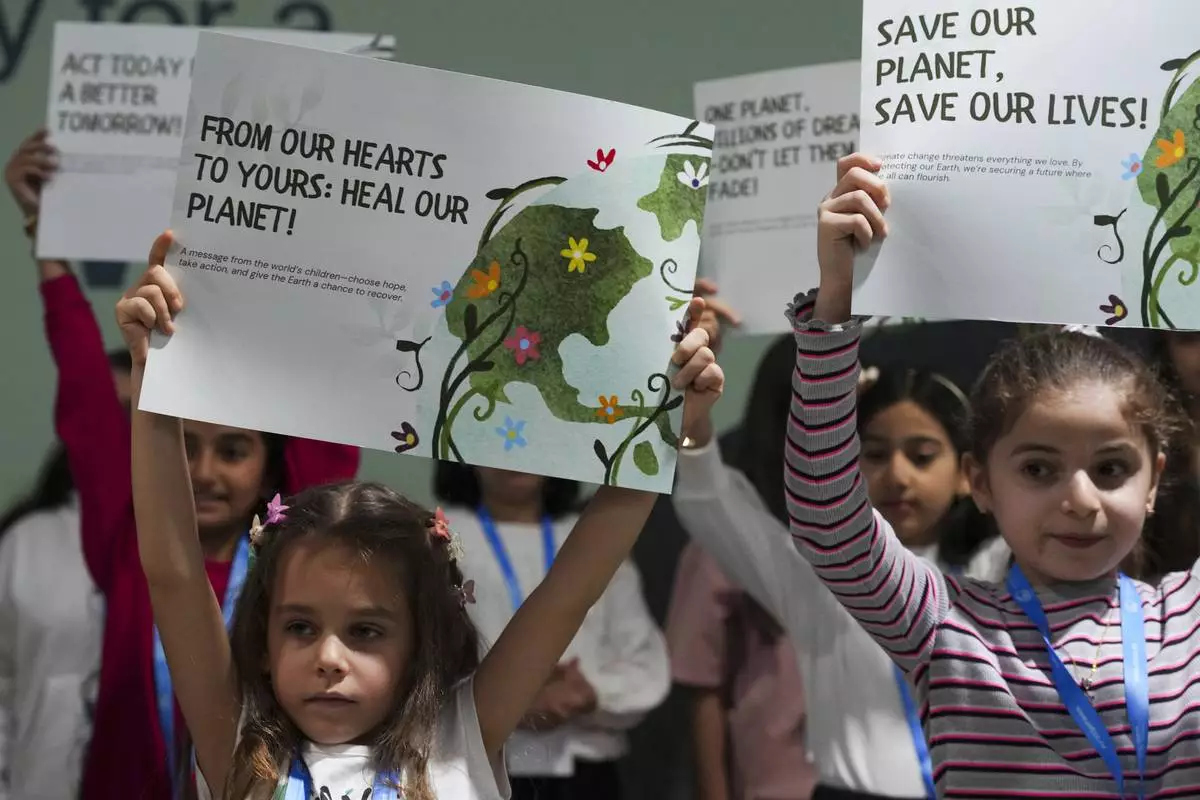
Children advocate for a clean planet during the COP29 U.N. Climate Summit, Thursday, Nov. 21, 2024, in Baku, Azerbaijan. (AP Photo/Peter Dejong)
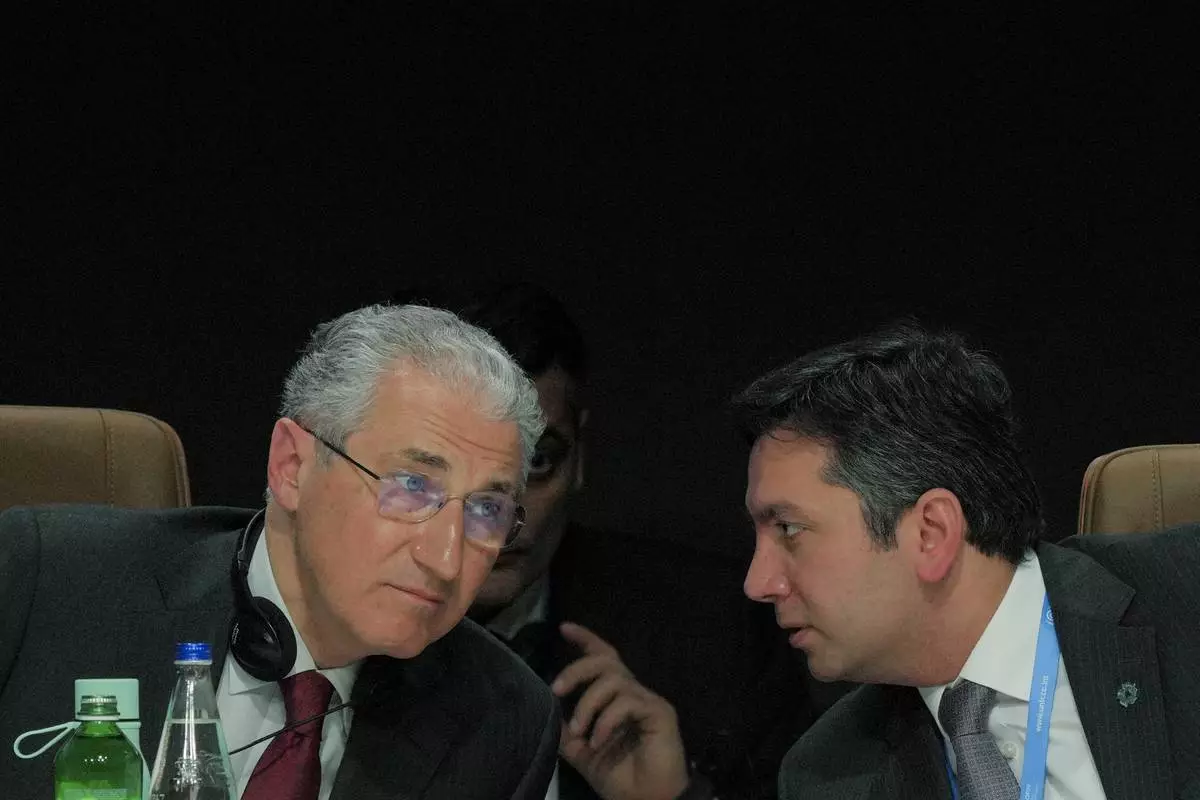
Mukhtar Babayev, COP29 President, left, and Yalchin Rafiyev, Azerbaijan's COP29 lead negotiator, speak during a plenary session at the COP29 U.N. Climate Summit, Thursday, Nov. 21, 2024, in Baku, Azerbaijan. (AP Photo/Peter Dejong)
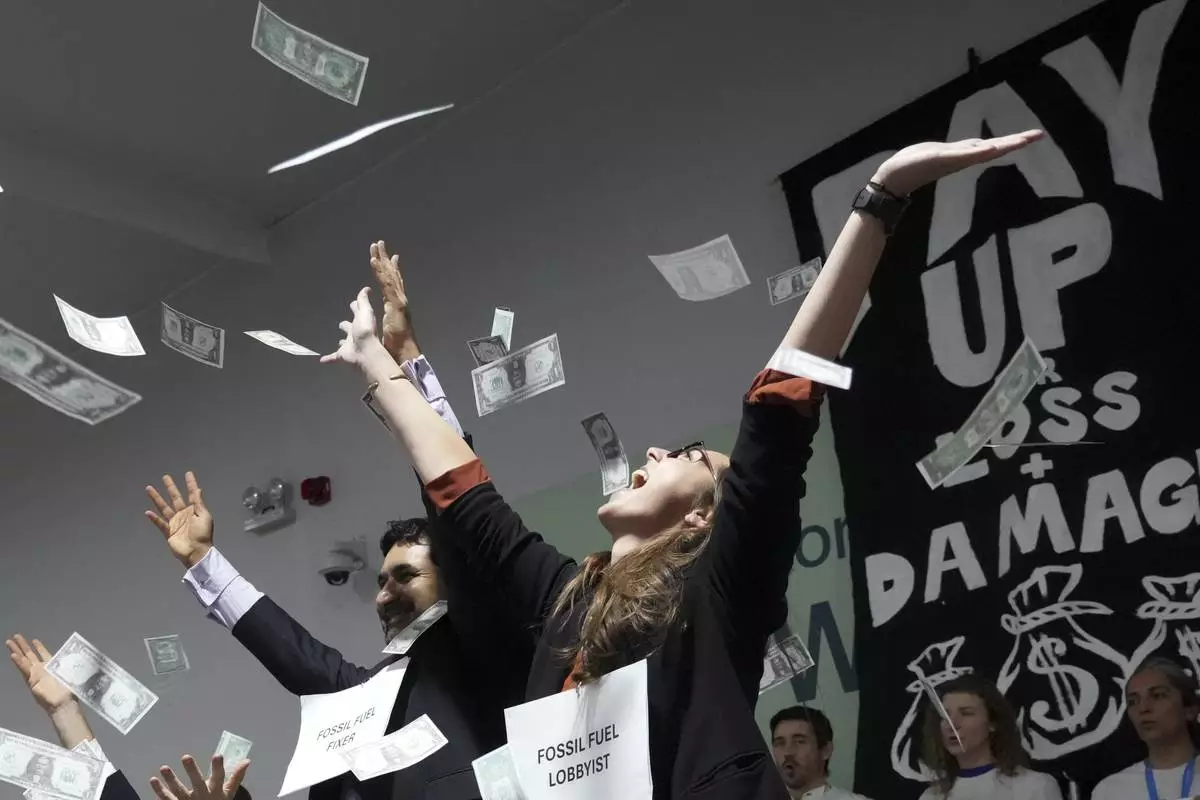
Activists participate in a demonstration for climate finance at the COP29 U.N. Climate Summit, Thursday, Nov. 21, 2024, in Baku, Azerbaijan. (AP Photo/Sergei Grits)
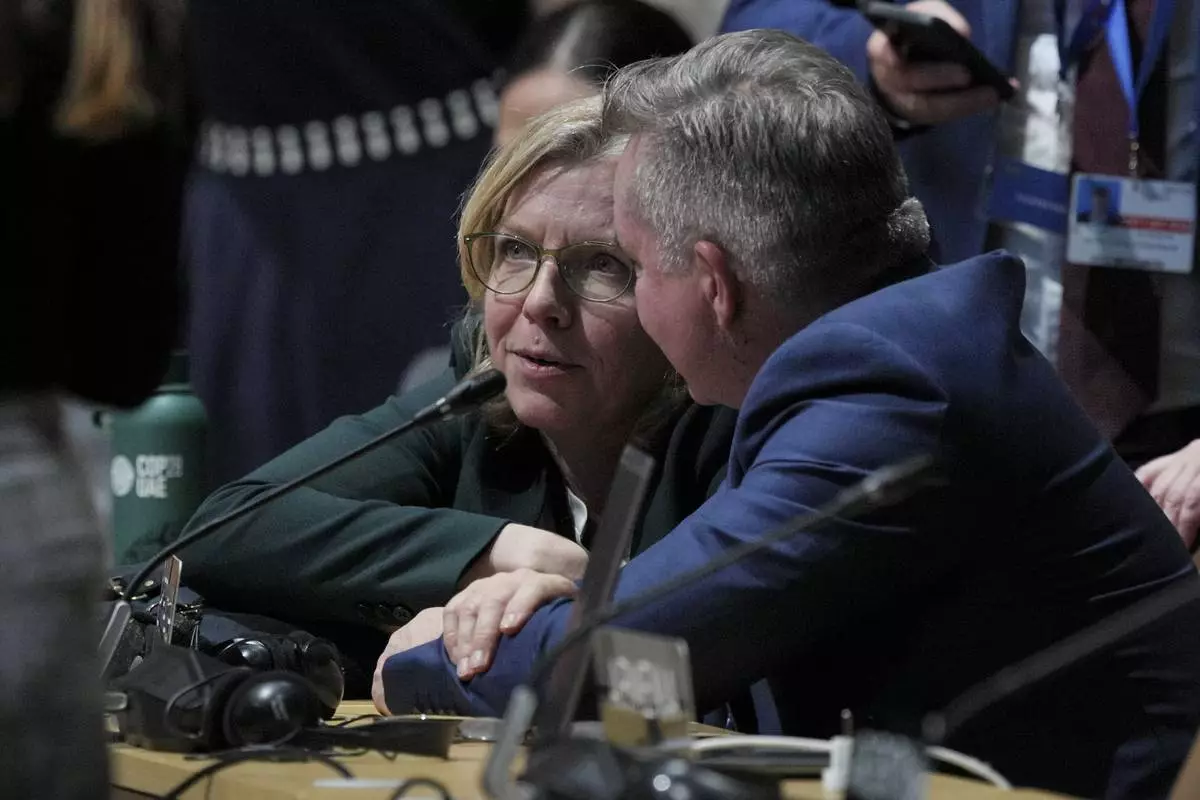
Austria Climate Minister Leonore Gewessler, left, talks with Australia Climate Minister Chris Bowen before a plenary session at the COP29 U.N. Climate Summit, Thursday, Nov. 21, 2024, in Baku, Azerbaijan. (AP Photo/Peter Dejong)
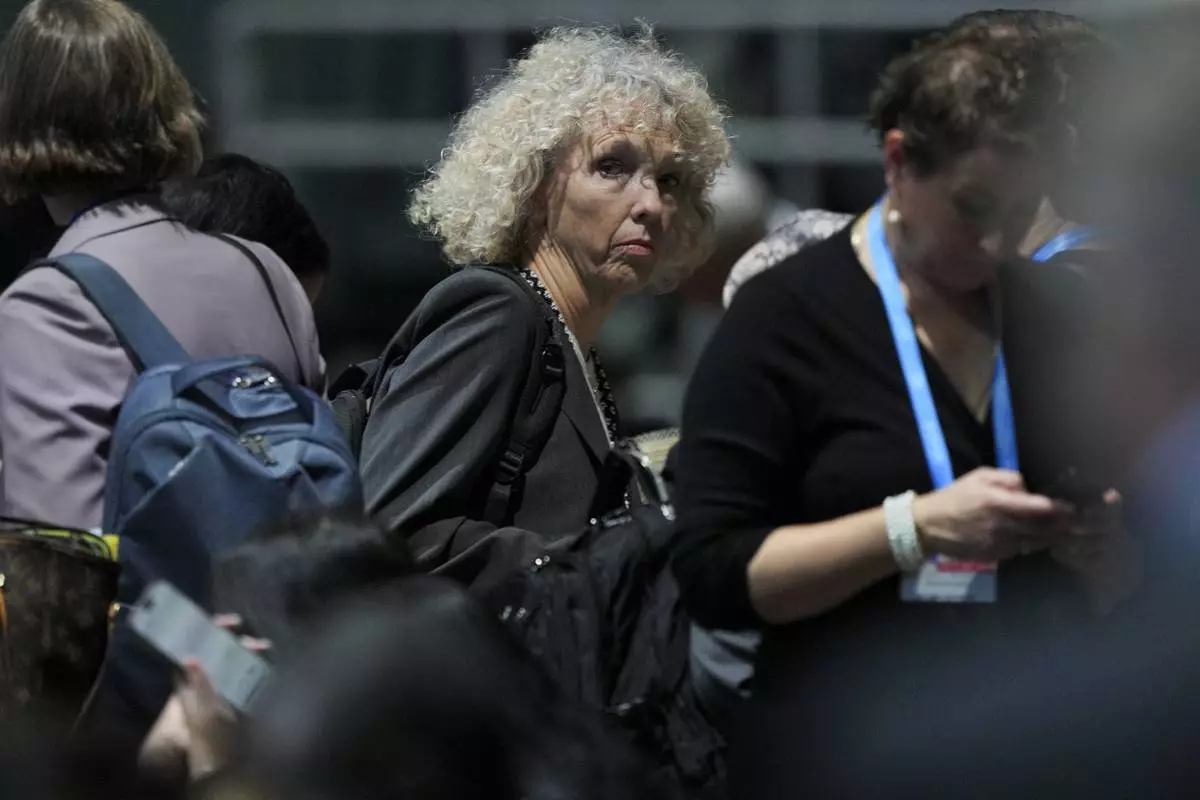
Jennifer Morgan, Germany climate envoy, arrives ahead of a plenary session at the COP29 U.N. Climate Summit, Thursday, Nov. 21, 2024, in Baku, Azerbaijan. (AP Photo/Peter Dejong)
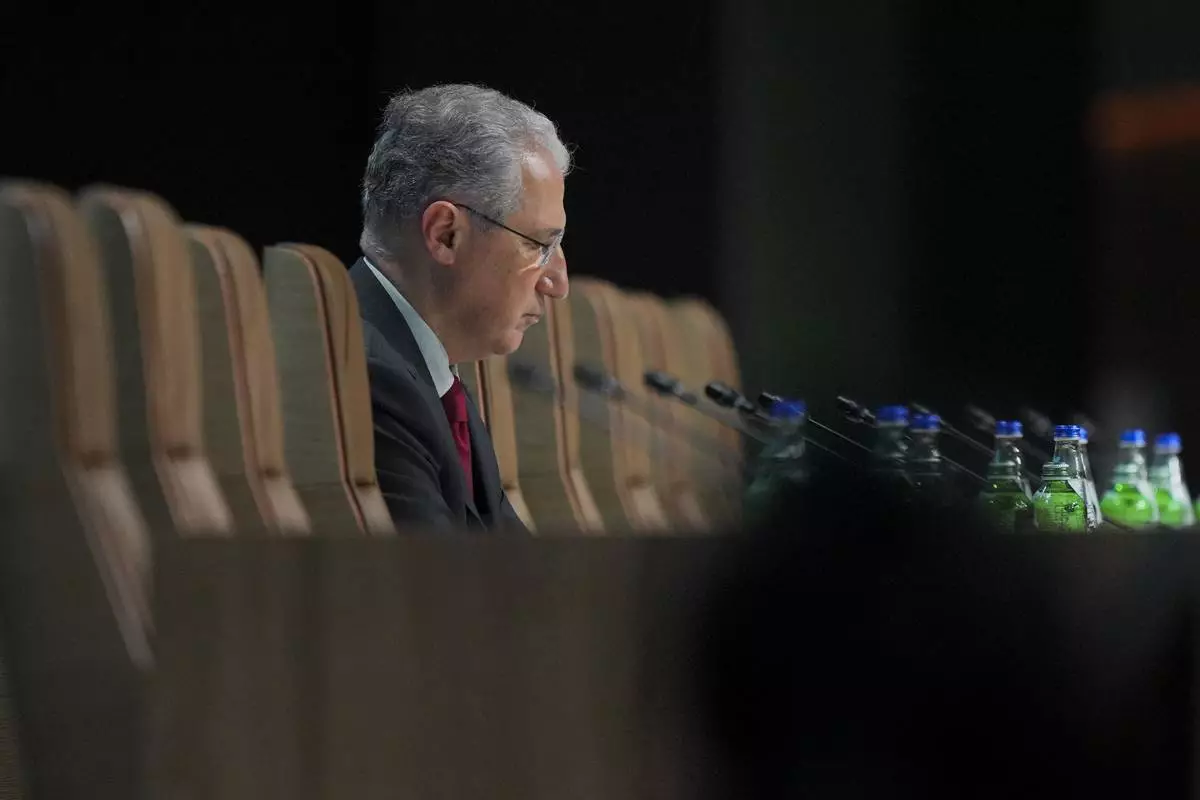
Mukhtar Babayev, COP29 President, arrives for a plenary session at the COP29 U.N. Climate Summit, Thursday, Nov. 21, 2024, in Baku, Azerbaijan. (AP Photo/Peter Dejong)
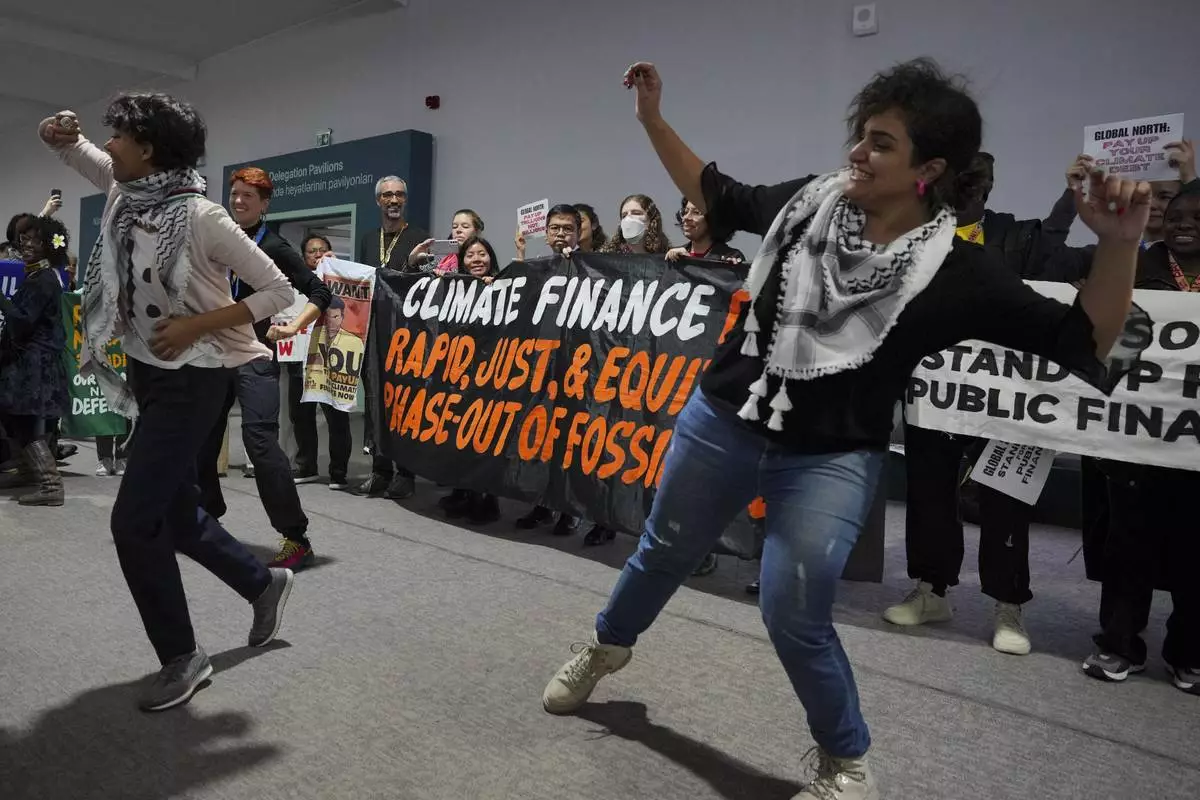
Activists participate in a demonstration for climate finance at the COP29 U.N. Climate Summit, Thursday, Nov. 21, 2024, in Baku, Azerbaijan. (AP Photo/Peter Dejong)
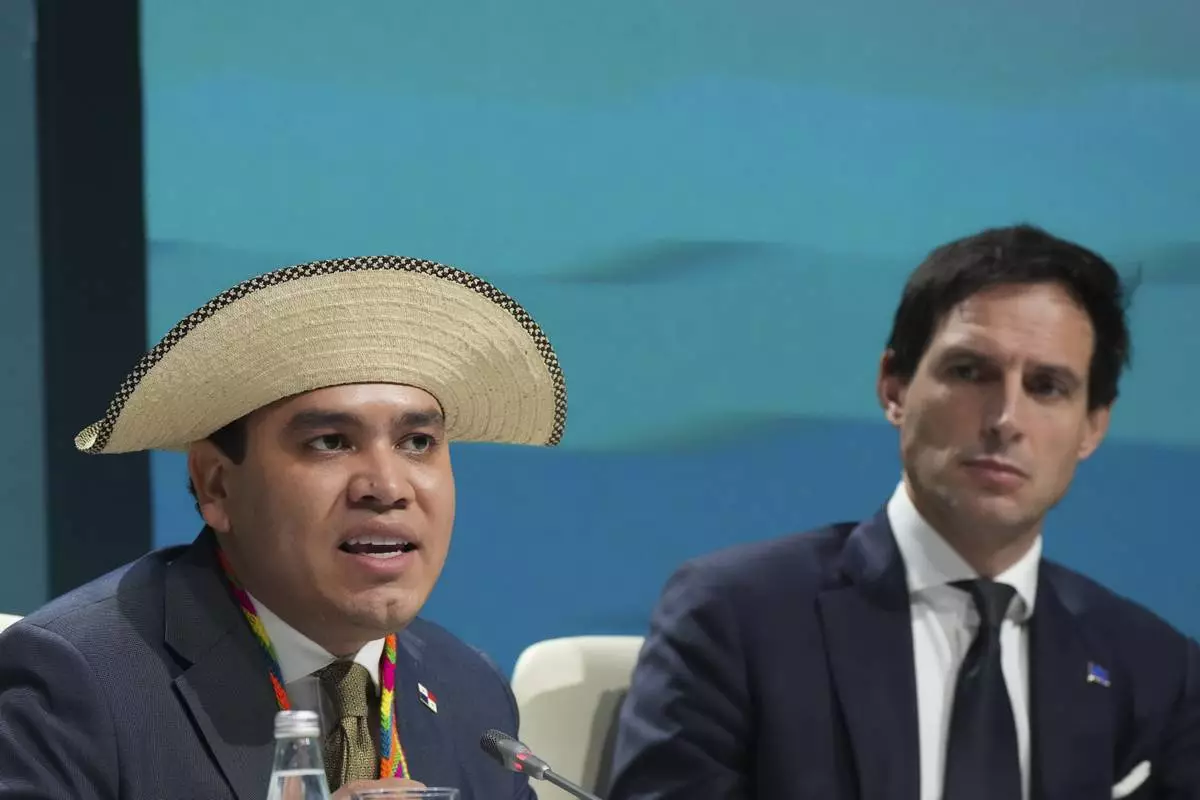
Panama Climate Envoy Juan Carlos Monterrey Gomez, left, and Wopke Hoekstra, EU climate commissioner, attend a session on climate targets during the COP29 U.N. Climate Summit, Thursday, Nov. 21, 2024, in Baku, Azerbaijan. (AP Photo/Sergei Grits)
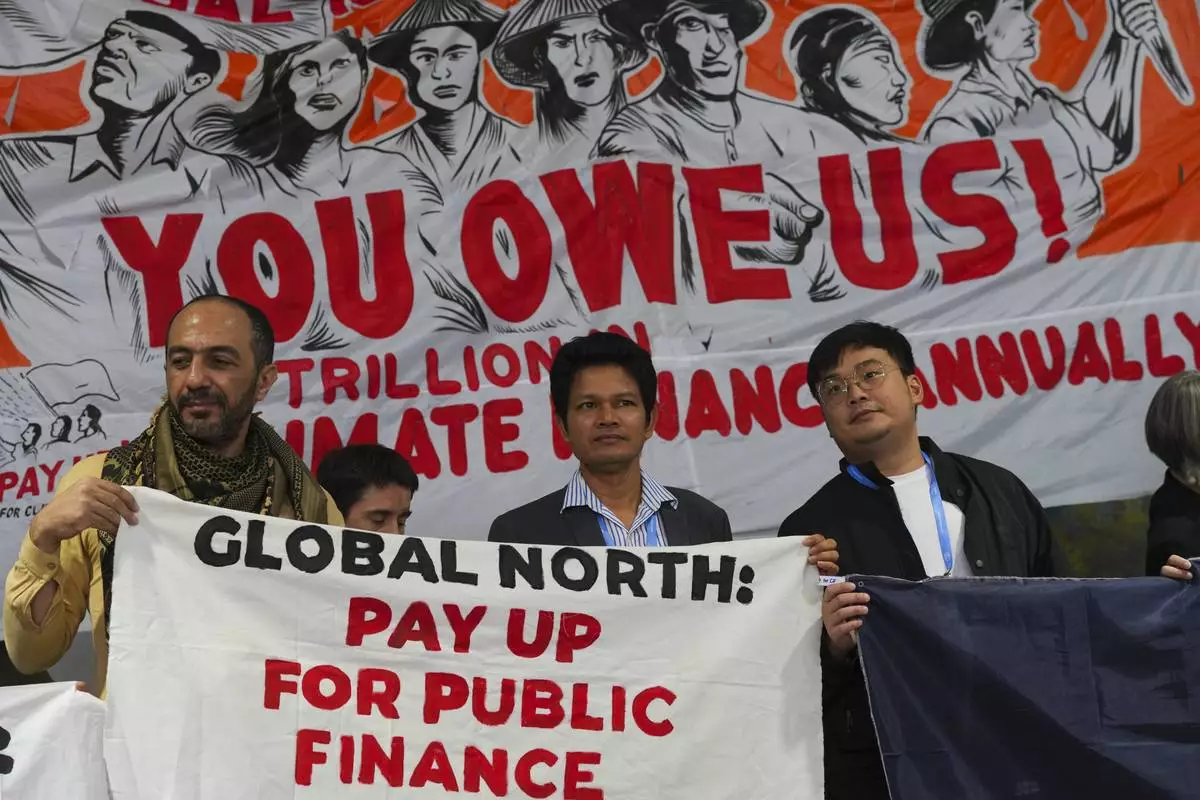
Activists participate in a demonstration for climate finance at the COP29 U.N. Climate Summit, Thursday, Nov. 21, 2024, in Baku, Azerbaijan. (AP Photo/Peter Dejong)
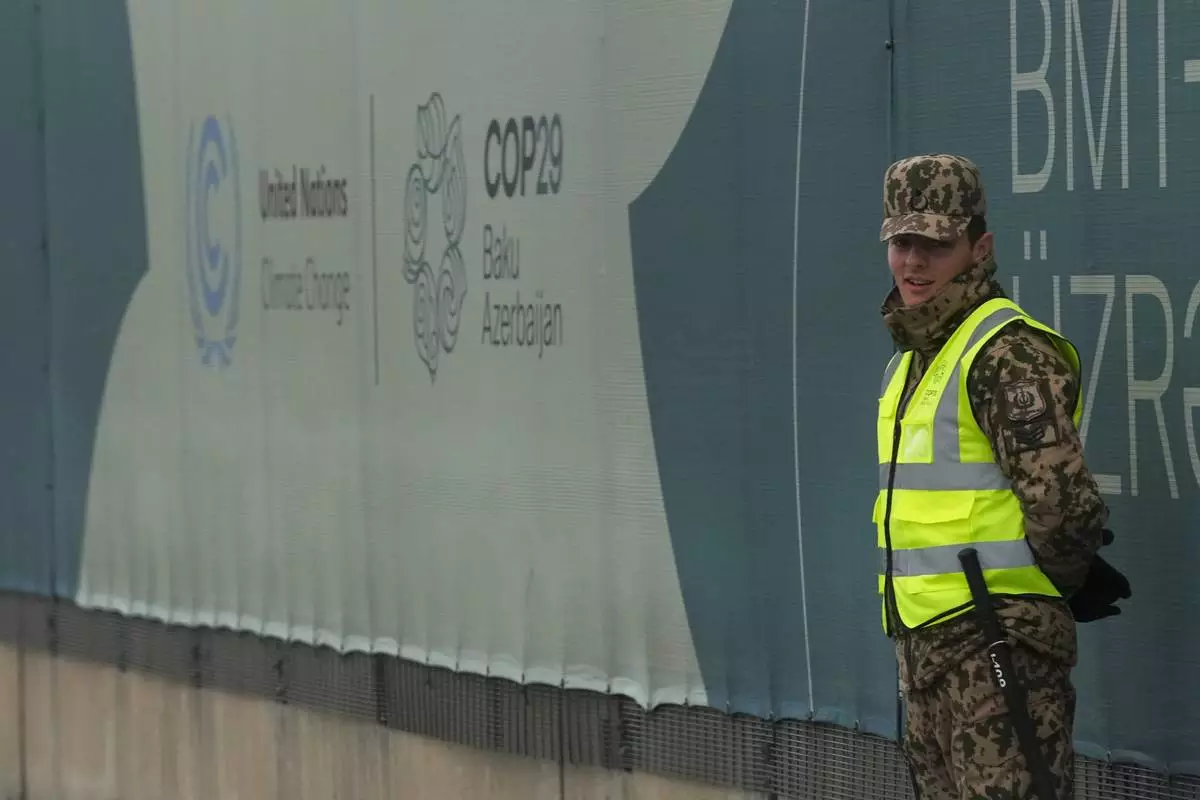
A security person stands near a logo for the COP29 U.N. Climate Summit, Thursday, Nov. 21, 2024, in Baku, Azerbaijan. (AP Photo/Peter Dejong)
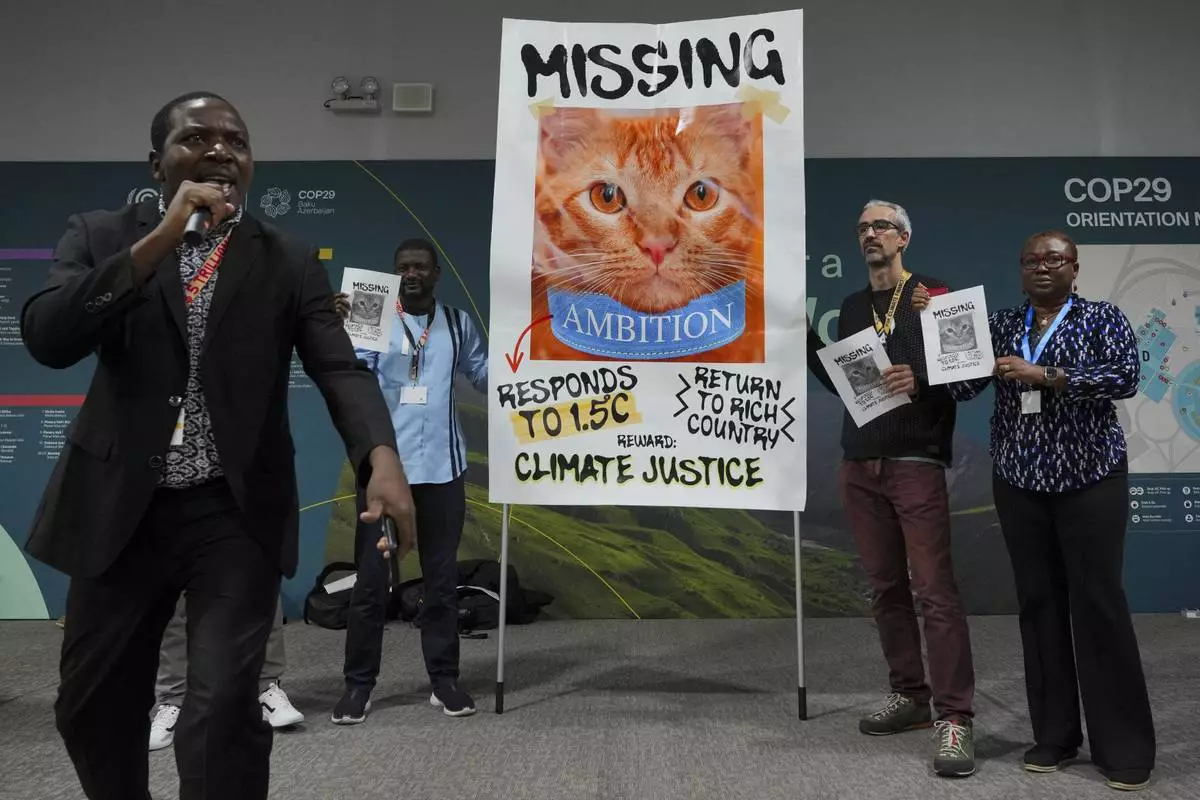
Activists participate in a demonstration for climate justice at the COP29 U.N. Climate Summit, Thursday, Nov. 21, 2024, in Baku, Azerbaijan. (AP Photo/Peter Dejong)




